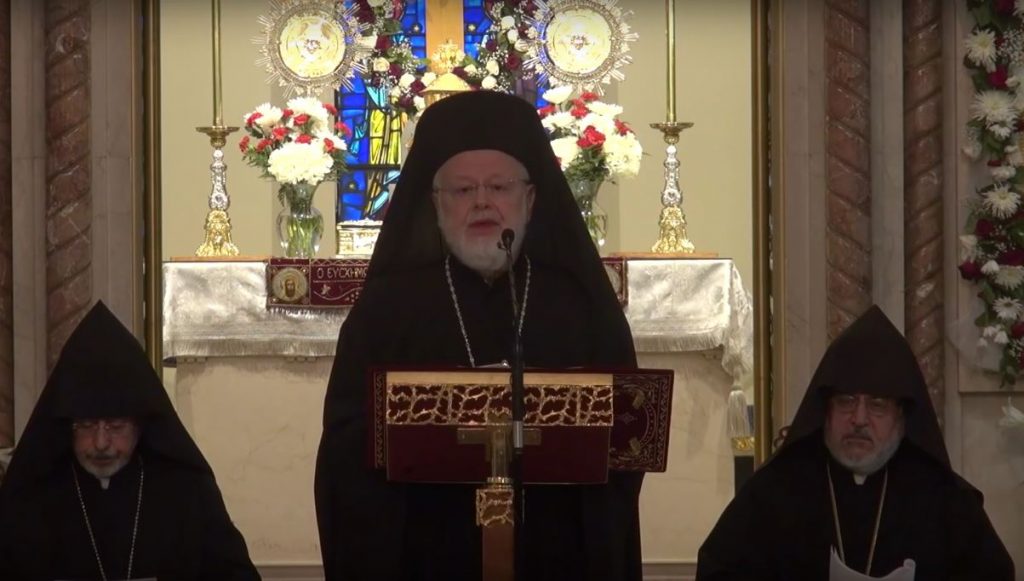His Eminence’s Full Remarks Available Below
BOSTON, Mass. (A.W.)—On April 22, His Eminence Metropolitan Methodios—the spiritual leader of the Greek Orthodox Metropolis of Boston—led the first ever Greek Orthodox Metropolis of Boston commemoration of the Armenian Genocide at the Annunciation Greek Orthodox Cathedral of New England.

(L to R) His Eminence Archbishop Khajag Barsamian, His Eminence Metropolitan Methodios, and His Eminence Archbishop Oshagan Choloyan
His Eminence hosted the 102nd commemorative event and presided over the special prayer service, which was attended by clergy and faithful from throughout New England.
His Eminence Archbishop Khajag Barsamian of the Eastern Diocese of the Armenian Church of America and His Eminence Archbishop Oshagan Choloyan from the Eastern Prelacy of the Armenian Apostolic Church—the two Armenian Apostolic leaders in the Eastern United States—also participated in the commemoration.
The 102nd anniversary commemoration was co-sponsored with the Massachusetts Council of Churches, of which the Greek Orthodox Metropolis of Boston and the Armenian Church in America are both members.
Below are His Eminence Metropolitan Methodios’ remarks in full as well as video footage of the commemoration.
***
On behalf of the clergy and laity of the Greek Orthodox Metropolis of Boston and New England, I welcome you today to our Cathedral and thank you for the privilege of hosting this Ecumenical Service commemorating the innocent martyrs of the Armenian Genocide.
This year marks the 102nd anniversary of the beginning of the horrific Armenian Genocide when on April 24, 1915, several hundred leaders of the Armenian community were arrested and executed. An additional million and a half soon followed, victims of starvation and disease, of inhumane treatment, of physical abuse, of torture and crucifixion.
The Armenian people who lived in eastern Turkey for nearly 3,000 years lost their homeland and were decimated in the first large scale genocide of the 20th century—a genocide which many in the so-called civilized world continue to deny. Despite the vast evidence that verifies the historical reality of this genocide—including eye-witness accounts, official archives, photographic evidence, reports of diplomats, and the testimony of survivors—denial of the Armenian Genocide, this colossal crime against humanity, continues to the present.
Henry Morgenthau Sr., United States Ambassador to the Ottoman Empire from 1913 to 1916 wrote, “I am confident that the whole history of the human race contains no such horrible episode as this. The great massacres and persecutions of the past seem almost insignificant when compared with the suffering of the Armenian race in 1915.” During this time, Armenian leaders and intellectuals were imprisoned, executed or deported. Men were disarmed, moved out of their homes and massacred. Women and children were marched to death, sold into slavery, forcibly converted to Islam, raped and killed. Thousands of families were forced from their homes and marched to concentration camps in the Syrian desert which became littered with decaying corpses. In the historic city of Trebizond, hundreds of women and children were drowned in the Black Sea. The Holocaust did not end here: churches, cultural monuments, schools, villages and towns were systematically destroyed to erase all traces of the Armenian civilization.
The Greek American community treasures the special bond, which exists between our two communities, because we shared the same fate. Greeks living in Pontos on the Black Sea and later throughout Asia Minor were forced to leave their homelands. Countless were “ethnically cleansed” from 1918 – 1923. The city of Smyrna was torched to force the exodus of both Greek and Armenian populations. The common denominator in the Armenian, Greek and later Kurdish genocides was the intention of creating a modern state that reflected Turkish nationalist ambitions and saw little place for Armenians and other Christian minorities. The perpetrators of these atrocities sought to generate public support for their racist and eliminationist program through their call for a “Turkey for the Turks.”
It is indeed tragic that the world soon forgot the atrocities perpetrated against Armenians, which were (and are) denied by the Turkish Republic. As new genocides occurred since 1915, the memorials created by the Armenian Communities provide a stark warning against ignoring these crimes and whitewashing the historical record. Humanity was an eye witness this past year to the ethnic cleansing of Christian martyrs, beheaded and crucified because of their faith. Sadly, even today—even in our own country—there is silence over these present-day atrocities that are perpetrated against Christians throughout the world.
Today, however, in this Cathedral, we come together to help put an end to this injustice of silence. Today, we come together in prayer and solidarity to commemorate those who were martyred and to remember those Christians who continue to suffer because of their faith. Today, our voices declare that, although more than a century has passed, the Armenian Genocide cannot be denied and must never be forgotten. This is our sacred responsibility—to shine light where there is darkness, to declare truth where there is falsehood, and to help ensure that such a tragedy never happens again.
His Eminence Metropolitan Methodios,
April 22, 2017
[youtube https://www.youtube.com/watch?v=cBAKFJ8jwUE?feature=oembed&w=620&h=349]
Source: Armenian Weekly
Link: His Eminence Methodios Leads First Ever Greek Orthodox Metropolis of Boston Armenian Genocide Commemoration
